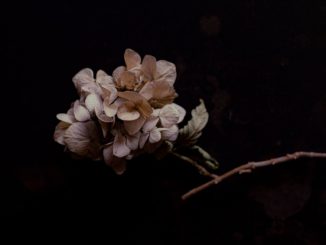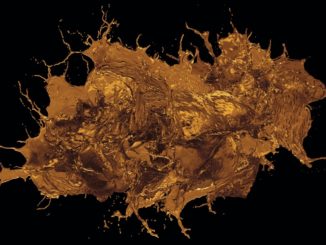
Almost every night, I meet my soulmate. And each time, he looks different. The other night, he was tall and dark, with salt-and-pepper hair and a gentle face like I’d never seen before. We stood in a halo of light from a lamp-post near the intersection of Elm and Yonge Streets. I realized this was the same spot where I’d watched a crowded dance performance during Nuit Blanche almost a decade before. How did we get here, so far from home?
It was clear we’d never met, so I extended my hand and my soulmate took it in his. As his other hand covered mine, a peculiar luminosity wrapped around our bodies like a cocoon and then fractured. A recognitional force took hold of us and the earth beneath us began to turn, faster and faster, like two little girls with clasped palms whirling themselves in circles until — sweaty and dizzy — they collapsed onto the earth. We were the fresh grass and the spinning starry sky and the girls themselves, all at the same time, all of us known to one another.
In the hymn to the Hindu goddess, the Devī Mahātmyam, the goddess Mahāmāya covers Lord Vishnu’s eyes with her hands. The goddess’s name translates to “the great illusion,” and her loving gesture sends the Lord into a divine sleep, which conjures forth the cycles of our existence from His dreams.
I don’t even believe in soulmates, and yet here was a parable of the primordial lovers — god and goddess playing with our lives in their days and nights. I woke up from that night’s episode of this dream series, and I was lying pressed against my husband, grateful for his presence, silent and in the flesh. My own hands were clasped together above my head, strangeness coursing through them, then dissipating. There arose from within me a haiku:
static attraction
stranger conjured from the Self
love personified
On my daily walks, I try to stay six feet away from others like a good citizen. I search each person’s eyes from afar for a blink of mutual recognition above our cloth masks — is it him, my soulmate? Will one of these strangers turn up in my dream later that night, that week, years from now?
The Hindu saint Sri Ramana Maharshi said, “In dreams, the mind takes on another body.” How could a whole world of dream-people appear with such specificity in feeling and physicality, night after night? One of these fellow humans might be — o, must be — real, right?
Swami Lakshmanjoo, a scholar of the Hindu philosophy of Kashmir Shaivism, writes that all of the images arising during sleep actually exist within our own greater Self, which is the only reality. He says that in a dream state, we travel “on the waves of impressions.” And in a deeper state of dreaming, we can experience “the occasional touch of consciousness.”
During my daily meditations, I try to summon those “waves of impressions” in order to feel that “touch of consciousness” once again. A reunion with one of my soulmates is in the offing, I just know it, as I search in my mindscape for a parallel universe where he or she or they exist. Pondering space-time continuums and psychic astrophysics, I even wonder if these strange encounters are a preview of our next lifetime, like in that Erykah Badu song…
Just then, I am reminded of a verse by the great poet-saint of India, Jnaneshwar Maharaj, who said: “Whatever is seen in a dream appears to be real at the time, but when remembered on waking it has no reality. Similarly, know that this is an illusion, and your confusion, therefore, is in vain.”
And so it goes. Each morning, I awaken in that same dull confusion. I wiggle my fingers and toes like at the end of yoga class, and slowly recall who I am, where I live, what I’ve birthed, and how we live now. As the day’s schedule presses in, work-life and home-life becoming indistinguishable, the soulmates fade away. Overnight details blur, and the self-questioning begins. One māya takes over from another — the illusions of daytime quarantine replacing the illusions of my dreams.
Archana Sridhar
Archana Sridhar is an Indian-American poet and university administrator living in Toronto, Canada. Archana focuses on themes of meditation, race, motherhood, and diaspora in her poetry and flash writing. Her work has been featured in The Puritan, The Hellebore, Barren Magazine, and elsewhere. Her chapbook Renderings is available through 845 Press, and her writing can be found at www.archanasridhar.com.
Featured image: Artwork by Austin Park on Unsplash.



